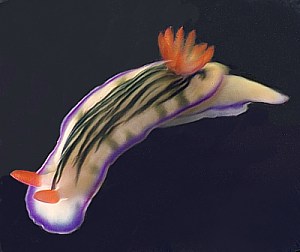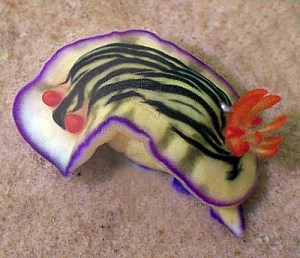

Hypselodoris nigrolineata
(Eliot, 1904)
Order: NUDIBRANCHIA
Suborder: DORIDINA
Superfamily: EUDORIDOIDEA
Family: Chromodorididae
DISTRIBUTION
Indian Ocean
PHOTO
Oyster Bay, Dar es Salaam, Tanzania, April 1975. 35mm long alive. PHOTOS: Bill Rudman.
Hypselodoris nigrolineata is rather similar in colour to the Western Pacific species Hypselodoris maritima. H. nigrolineata differs in having a purplish mantle border, blue in H. maritima, and in having diffuse black patches between the purple border and the black lined central region. No similar patches occur in H. maritima. One other major external difference is that in H. nigrolineata the gills are a translucent orange while in H. maritima they are white with orange edging. At present H. nigrolineata is known only from East Africa.
References:
•Rudman, W.B. (1977) Chromodorid opisthobranch Mollusca from East Africa and the tropical West Pacific. Zoological Journal of the Linnean Society 61: 351-397.
•Rudman, W.B. (1982) The Chromodorididae (Opisthobranchia: Mollusca) of the Indo-West Pacific: Chromodoris quadricolor, C. lineolata and Hypselodoris nigrolineata colour groups. Zoological Journal of the Linnean Society 76: 183-241.
Rudman, W.B., 2000 (May 1) Hypselodoris nigrolineata (Eliot, 1904). [In] Sea Slug Forum. Australian Museum, Sydney. Available from http://www.seaslugforum.net/find/hypsnigrol
Related messages
Unknown Hypselodoris from Sodwana Bay
January 19, 2010
From: Colin Ogden

Hi Bill.
Please can you help with this one. I found 2 of them faily close together and at first thought that they were Hypselodoris carnea, but when I downloaded I couldnt ID them. I cant find their ID in any of my books and would appreciate your help.
Locality: Sodwana Bay, 18 metres, South Africa, Indian, 12 Jan 2010, reef. Length: 50mm. Photographer: Colin Ogden.
Regards
Colin
scubaco@iafrica.com
Ogden, C., 2010 (Jan 19) Unknown Hypselodoris from Sodwana Bay. [Message in] Sea Slug Forum. Australian Museum, Sydney. Available from http://www.seaslugforum.net/find/23103Dear Colin,
This is Hypselodoris nigrolineata. Apart from Eliot's description in 1904 and my rediscovery of it in 1975 in East Africa, I think this record of yours is the third animal which I would confidently identify as this species. We have another on the Forum from Reunion, which I have hesitantly identified as H. nigrolineata, but the much thinner black lines make me a bit doubtful.
Best wishes,
Bill Rudman
Hypselodoris nigrolineata from Reunion Is.
February 3, 2009
From: Sully & Monika Bachel


Concerning message #2345:
Dear Bill
Here is a nudibranch found by my wife Monika. It was moving on a sandy rock and it is probably Hypselodoris nigrolineata
What is your opinion?
Locality: La Possession, 4 m, Reunion Island, Indian Ocean, 31 January 2009. Length: 35 mm. Photographer: Sully Bachel.
Best regards
Sully
s.bachel@orange.fr
Bachel, S., 2009 (Feb 3) Hypselodoris nigrolineata from Reunion Is.. [Message in] Sea Slug Forum. Australian Museum, Sydney. Available from http://www.seaslugforum.net/find/22219
Dear Sully,
This is an interesting find. There are very records of H. nigrolineata since its original description in 1904. I have only ever seen a couple of live specimens so your photos area valuable addition to our knowledge. There are a number of examples of what we can call 'species pairs' found in the Indo-West Pacific with two apparently closely related species with small external differences, one species found in the western Indian Ocean and the other in the western Pacific Ocean. Hypselodoris nigrolineata has such a pair in the western Pacific which we know as H. maritima. The main differences in colour pattern are that H. nigrolineata has black tranverse smudges around the mantle edge, which are absent in H. maritima, and H. maritima usually has a submarginal yellow band on the mantle which is absent in H. maritima.
Best wishes,
Bill Rudman
Hypselodoris nigrolineata from Tanzania
May 2, 2000
From: Bill Rudman
I have added a page on Hypselodoris nigrolineata for comparison with what appears to be a colour form of Hypselodoris maritima in a message from John-Paul Koninx.
Bill Rudman.
